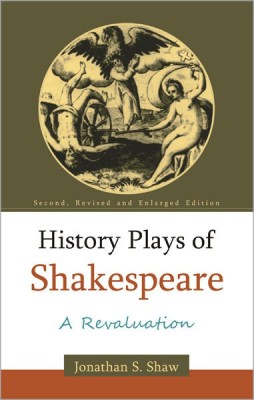History Plays of Shakespeare a Revaluation(English, Hardcover, Shaw Jonathan S.)
Quick Overview
Product Price Comparison
ŌĆ£From his admirable grasp of both primary and secondary sources, Jonathan Samuel Shaw has produced a well organized work on ShakespeareŌĆÖs History plays which throws new lights on several problems of Elizabethan Literature. Furthermore, the authorŌĆ” makes a highly commendable and convincing attempt to consider these plays in the light of the Indian concept of rasas and types of characters which should interest and stimulate scholars both in India and overseas.ŌĆØ George Shepperson William Robertson Professor of History University of Edinburgh, Scotland Few subjects, if any, have accumulated so vast and astonishing a body of scholarship as the study of ShakespeareŌĆÖs plays. The plays written by him about the English Kings were christened as histories, but the modern approach to Shakespeare relates the plays to Elizabethan concepts of degree and order, and to the politics of time. However, the works of Shakespeare transcend time and space and as such can be studied in the light of Indian dramaturgy. The book is a refreshingly fresh analytical study of the six uncontroversial ŌĆśHistoriesŌĆÖ of ShakespeareŌĆöRichard III, King John, Richard II, Henry IV Parts 1 and 2, and Henry V. The study takes into account the Tudor Historiography also, which is reflected in the works of the popular historians of the age, viz. Edward Hall, Raphael Holinshed, Polydore Vergil, Jean Froissart, etc. It also surveys in brief the divergent political cross-currents during the times, taking specially into consideration the Homilies and the Ecclesiastical Polity of the late Medieval Age and the Renaissance. The various source materials of ShakespeareŌĆÖs Histories are thus placed in the right perspective. This forms the backdrop milieu against which the Histories of Shakespeare are studied empathetically with special reference to the omissions and commissions effected by Shakespeare. An attempt has been made to keep the approach unbiased and objective as far as possible. Breaking new ground, the Indian theories of rasa and Sanskrit dramaturgy have also been applied to the plays. The analysis of the works leads to the conclusion that despite various topical constrains and prejudices, Shakespeare manages to remain unaffected as an artist. By and large remaining faithful to the basic contours of history, he succeeds in recreating the past with an essentially and eternally valid moral vision of life, which is not dissimilar to the vision witnessed in his other works. The book will prove immensely useful to the students and teachers of English literature, Shakespearean studies and researchers in these fields.


